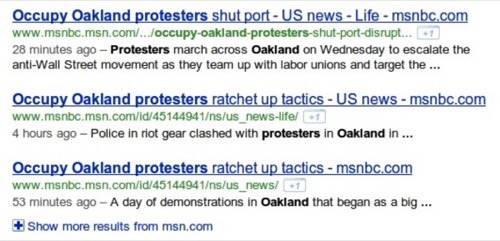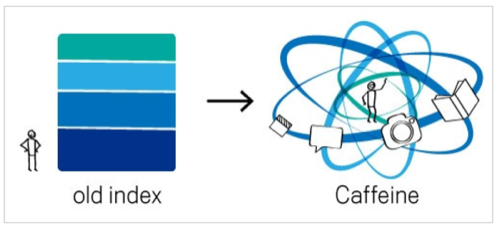Google announced a big change to its search ranking algorithm today that affected around 35% of searches. It now makes an effort to determine when a query should return more up-to-date, “fresher” search results, before more established but older links. For example, if you search for “olympics,” you’re likely to be looking for information about the upcoming 2012 Summer Olympics, rather than older or more general information. Google search is now fine-tuned to make that assumption.

With Google+ indexed in Web search and providing real-time search data, Google now has strong signals for timeliness and relevance. By tweaking search algorithms on one side and gathering social data on the other, Google is working towards a clearer of picture of what’s happening on the Web this instant.
Today’s updates are built on top of Caffeine, Google’s new search infrastructure that first came online in 2009. The effects kicked in in June 2010, providing “50 percent fresher results.” Today’s changes fine-tune the notion of “freshness” along three major categories:

- Recent events or hot topics like breaking news – stories that might be only minutes old.
- Regularly recurring events like elections, conferences or sports games.
- Frequently updated info like product reviews.
Google Going Real-Time

As illustrated by the above graphic from the 2010 announcement of Caffeine, Google wants to get away from the boring stack vision of page ranking and smartly determine what kinds of results are relevant for each query. That requires Google to index in real time. Caffeine accomplishes this on the crawling side, and Google is also working on publishing systems and networking protocols to alert the search index of new content faster.
But social networks lead users to do the real-time publishing and alerting work themselves, making Google, Twitter and Facebook’s jobs of surfacing relevant content easier.
Google+ And Real-Time Search
That’s why Google partnered with Twitter in 2009 for real-time search. But that deal – along with real-time search – was shut down this summer. It wasn’t beneficial for either party anymore. Twitter is now acquiring search companies for its own purposes, and Google has started its own social network.
Public Google+ posts are now incorporated into search results, and Google is practicing with home-grown real-time search within the social network. By collecting social signals, Google can further improve the “freshness” of its search results with a human touch.
Are your Google searches smart about returning timely results? Share your experiences in the comments.

















